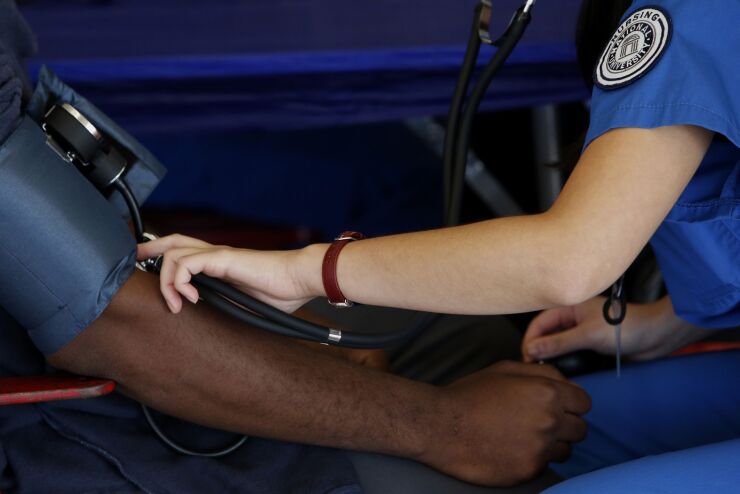There's a rare area of bipartisan agreement these days: the need for more government action to help fill the hundreds of thousands of vacancies for healthcare workers.
Legislators on both the state and federal level are turning their attention to how to meaningfully address this issue that's been plaguing healthcare for years and worsened during the pandemic. A bipartisan group of 14 U.S. senators sent a letter to the Centers for Medicaid and Medicare last week seeking to extend an expiring program that helps
The federal government has already taken some steps, including a $1.8 billion program to create 1,000 new residency slots in the next five years at hospitals in under-served communities. The Biden administration allotted $103 million from the American Rescue Plan to improve retention and well-being for healthcare workers. Meanwhile, legislation introduced in Congress would boost residency slots, route more medical residents to under-served areas, and pause student loan obligations during residency. Another measure would grant tens of thousands of
"Certainly there are a lot of tools at the federal government's disposal as well as at the state and local levels to deal with these issues," said Zachary Baron, associate director of the O'Neill Institute for National and Global Health Law at Georgetown University in Washington, noting the broad bipartisan consensus to address the issue.
Read more:
Training new nurses and doctors is expensive, and there's a dearth of instructors and clinical spots for those who want to pursue work in the industry. The shortages are having a significant financial impact on hospitals. Fitch Ratings saw operating margins at the nonprofit hospitals it tracks shrink by five to seven percentage points between 2021 and last year, mainly because of higher labor costs, according to senior director Kevin Holloran.
While expenses for travel nurses have eased, hospitals and nursing homes will still be paying more for labor than before the pandemic, and the impact is even worse at smaller and unrated facilities, he said.
Beyond the federal proposals, states are taking action, too. A Republican state senator introduced a bill in Washington in late January aptly called: "Reducing barriers and expanding
The measure allows use of simulated clinical instruction as part of the certification process and creates at least two pilot programs for high schoolers in rural areas to train as certified nursing assistants. It also allows the state to approve undergraduate programs where instructors have graduate degrees and experience, but not necessarily PhDs. It has seven Republican and 13 Democratic co-sponsors.
Boosting training and tuition assistance can help, said Mark Pascaris, a director at Fitch, but only to a limited degree. "You can't just overnight create a million new nurses," he said. Easing visa requirements for overseas providers could have the most impact, but "the political environment right now is not exactly pro-immigration."
The U.S. needs to fill an estimated 450,000 nursing slots in the next two years and more than 120,000 doctor positions over the next decade, U.S. Senator Bernie Sanders said at a hearing last month of the Senate Health, Education, Labor and Pensions committee he chairs. Lack of access to basic care affects almost 100 million Americans, lowers life expectancy and is "incredibly wasteful from a financial perspective," Sanders said.
Read more:
"The American people want this committee to produce some serious legislation that address these crises, and that is exactly what we must do," said Sanders, an independent from Vermont who caucuses with Democrats. He and others at the panel said the government must expand debt forgiveness and training programs.
Meanwhile, about 90,000 qualified applicants are turned away from nursing schools each year because of a shortage of slots, "and there is not enough scholarship and loan repayment money to support nursing students," Sarah Szanton, dean of the Johns Hopkins School of Nursing told the senate committee.
But there are also significant barriers to expanding instruction for providers, said James Herbert, president of the University of New England, which operates the only medical school in Maine. The number of slots for clinical training has shrunk in recent years, he said in the hearing, "as financial margins have tightened," and "practicing clinicians have fewer resources and less time to devote to students."
Staffing shortages will particularly impact
States need to do more, too, said Senator Bill Cassidy, the health committee's ranking member and a Louisiana Republican and physician, including rethinking qualifications for instructors. "A good RN can teach a nursing student no matter if she has a masters or a bachelor's of nursing, and we need to be practical," he said.






